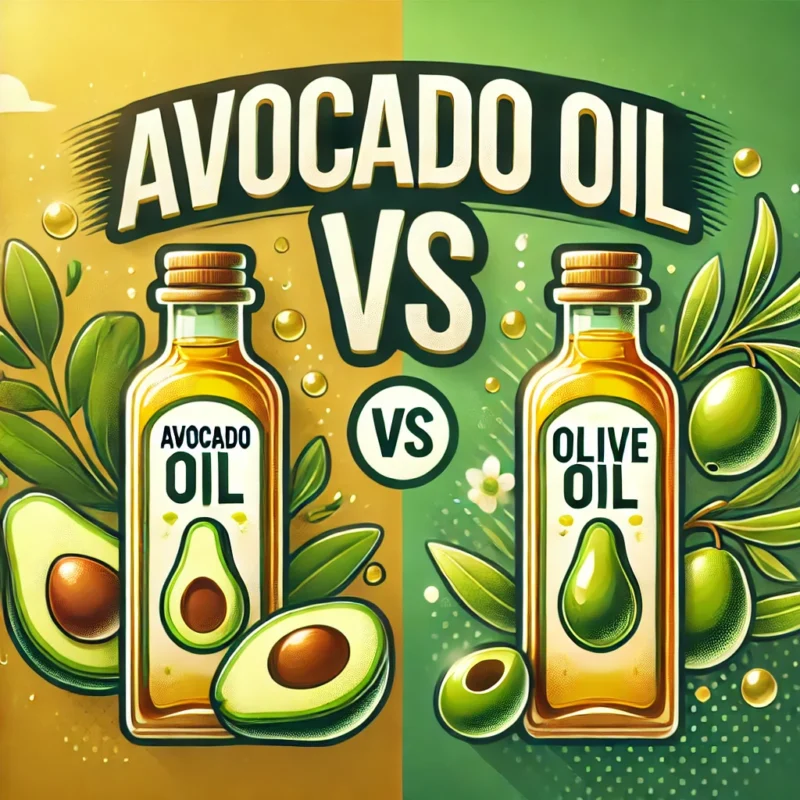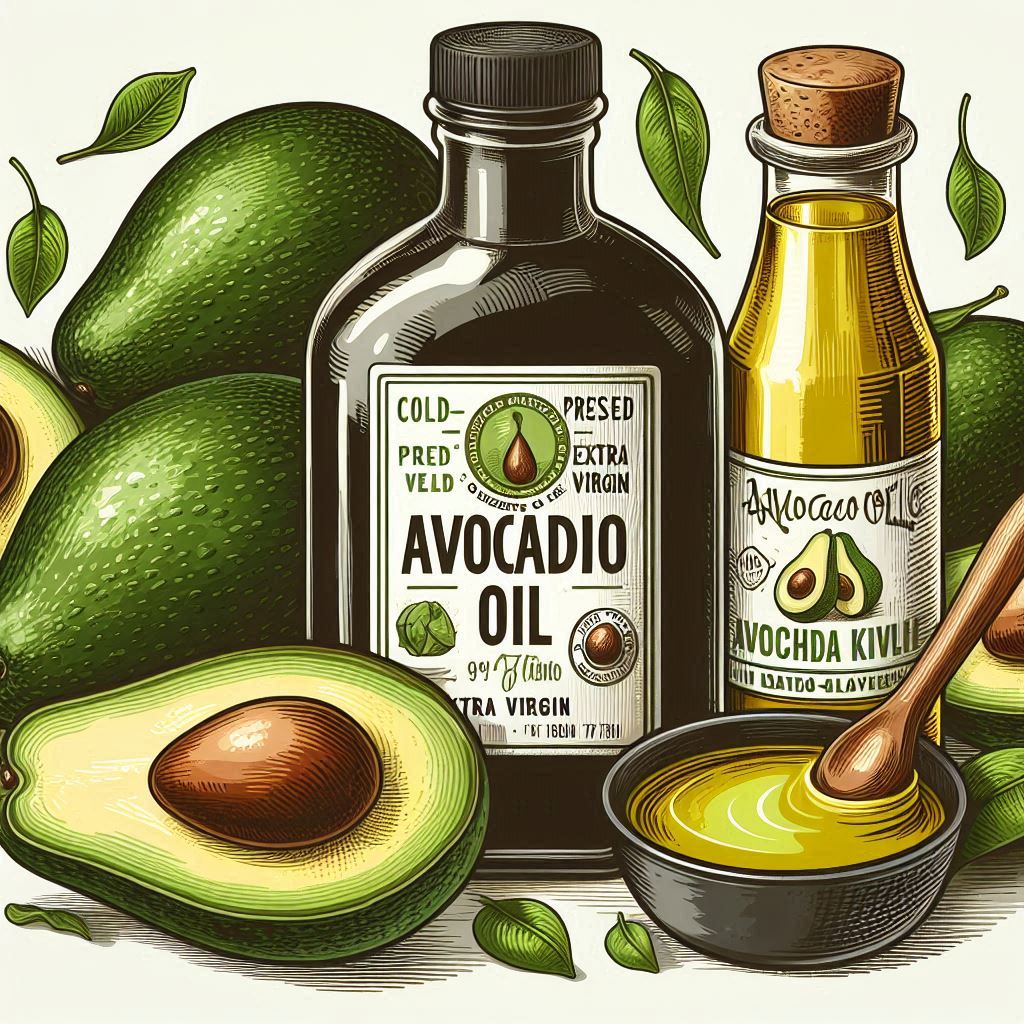The argument of avocado oil vs olive oil usually surfaces while deciding which healthy oil best fits your way of life. Though both oils have special advantages and are essential in healthy diets, knowing what sets them apart can help you choose the best one. We’ll talk about what makes these oils unique, compare their nutritional values, and help you choose the best one for your needs today.
What Are Avocado Oil and Olive Oil?
Understanding how each is produced and what distinguishes avocado oil from olive oil in terms of health and culinary use would help you to completely value the variations between the two.
What is avocado oil?
The flesh of ripe avocados yields avocado oil. Renowned for its bright green color, it tastes buttery and goes nicely with a range of foods. High content of heart-healthy monounsaturated fats, vitamin E, and anti-inflammatory
loved. Avocado oil’s high smoke point makes it also a popular choice for grilling, roasting, and frying.
What is olive oil.
Derived from squeezed olives, olive oil has long been a mainstay of Mediterranean diets. Its earthy, almost fruit-like taste and golden-yellow to greenish colour are well-known. Olive oil is the best quality and most nutritious choice among several grades; extra virgin, cold-pressed, and unprocessed is the most natural one. Rich in monounsaturated fats and antioxidants, olive oil is an excellent choice for heart health, just as avocado oil is.
Nutritional Comparison: Avocado Oil vs. Olive Oil
Choosing the finest oil for your health depends on knowing the nutritional variations between olive and avocado oil.
Nutrients in Avocado Oil
With a somewhat higher concentration of vitamin E, a potent antioxidant supporting immune system and skin health, avocado oil stands apart. It also boasts more plant sterols, which might help lower cholesterol.
- It is high in monounsaturated fats, accounting for approximately seventy percent of all fat.
- Each tablespoon has about 124 calories.
- Contains lutein, an antioxidant vital for good eye health.
Nutrients in Olive Oil
In terms of its nutritional profile, olive oil is truly remarkable. It is especially high in polyphenols, substances that have powerful anti-inflammatory and antioxidant action.
- Per tablespoon, it has roughly 119 calories.
- It is rich in monounsaturated fat and oleic acid.
- It provides relatively modest levels of vitamin E and vitamin K.
Fat Content and Composition
Despite being excellent sources of healthy fats, the compositions of both oils differ slightly:
- Avocado oil: Slightly higher in monounsaturated fats, making it more stable at higher cooking temperatures.
- Olive oil, especially extra virgin varieties, offers a balanced fat profile and increased polyphenols.
Antioxidants and Other Nutrients
Olive oil boasts the best antioxidant value among others because of its high polyphenolic and hydroxytyrosol content, which help to explain its heart-protective qualities. Avocado oil does, however, have more lutein and vitamin E, which are beneficial for skin and eye conditions.
Comparison of Health Advantages
When you compares the health advantages of avocado oil vs. olive oil, finds that both are nutrient-dense choices that can boost general well-being. Each oil helps you in different ways, as shown above.
Heart Health
Monounsaturated fats abound in both avocado and olive oils, which can help lower harmful cholesterol (LDL) and raise beneficial cholesterol (HDL). However, olive oil takes the lead due to its high concentration of polyphenolic compounds, which reduce inflammation and improve vascular function.
- Avocado oil contains plant sterols that are known to lower cholesterol and boost cardiovascular function.
- Antioxidants like hydroxytyrosol, which are abundant in extra virgin olive oil, further support heart health.
Skin and Eye Health
Both oils have vital ingredients that help promote eye health and nourish the skin.
- Avocado oil: is rich in lutein, a carotenoid that protects against age-related macular degeneration and improves eye health. It also has vitamin E, which shields the skin from free radical damage and moistens it.
- Olive Oil: Squalene and other antioxidants in olive oil aid in retaining hydration and fighting skin ageing. Its anti-inflammatory qualities can calm redder skin.
Immune Support
These oils’ nutrients—especially their antioxidants and vitamins—also support a more robust immune system.
- Avocado oil contains vitamin E and anti-inflammatory plant sterols, which reduce oxidative stress and boost immunity.
- Olive oil’s polyphenols boost immunity by having antibacterial and anti-inflammatory effects.
Nutrient Absorption
Both oils have a less-known advantage in improving the absorption of fat-soluble vitamins, including A, D, E, and K.
- Avocado oil: is perfect for enhancing the absorption of carotenoids in foods like salads and vegetables because of its high fat content.
- Olive Oil: Especially when drizzled on cooked or raw foods, olive oil improves the bioavailability of certain minerals.
Flavor and Culinary Uses
Avocado oil’s particular flavor and culinary uses against olive oil can affect how you use it in your dishes.
Flavor Profiles of Both Oils
- Known for its gentle, buttery taste, avocado oil goes excellently with neutral meals or recipes when you want the taste of the oil not to overwhelm.
- Olive oil tastes more strongly earthy, sometimes spicy. Particularly extra virgin olive oil smells delicious and goes excellently in Mediterranean-style cuisine.
Cooking With Avocado Oil
The high smoke point of avocado oil—about 520°F/271°C—makes it perfect for high-heat cooking techniques, including fried, roasted, and grilled food. Its neutrality accentuates food without changing its taste.
Cooking With Olive Oil
Despite having a lower smoke point—about 375°F/191°C—olive oil, especially extra virgin, is perfect for sautéing, baking, and adding extra flavour to finished food. Olive oil’s excellent taste accentuates bread dips, spaghetti, and salad dressings.
Smoke Point and Cooking Versatility
Knowing their smoke points and how they behave in many cooking techniques helps you decide between avocado oil and olive oil. The temperature at which oil starts to burn, known as the smoke point, influences flavor and generates dangerous chemicals.
Which Is Better for High-Heat Cooking?
Avocado oil is the best choice whether you’re grilling, roasting, or frying. It is perfect for deep frying and stir-frying without losing its nutritional content or taste since it has a high smoke point of roughly 520°F (271°C), which helps it to retain stability under strong heat.
On the other hand, olive oil, particularly extra virgin, has a lower smoke point, typically around 375°F (191°C). It is most effective when used for light roasting, sautéing, and medium-heat cooking. But refined olive oil can manage mild heat better and has a somewhat higher smoke point.
Which Is Better for Raw Uses?
Olive oil is the preferable choice for raw uses, including salad dressings, drizzles, or dips, because of its strong, fruity taste and high antioxidant value. Its flavors improve meals, including fresh salads, pastas, and bruschetta.
Raw foods also benefit from avocado oil’s gentle and buttery taste, particularly for people who want a neutral taste free of overpowering other components. It’s a wonderful finishing touch on roasted vegetables or for homemade mayonnaise.
The pros and cons of each type of oil
Both oils offer unique benefits and minimal disadvantages, despite their significant health benefits. Here, we compare the relative performance of avocado oil and olive oil.
Benefits Unique to Avocado Oil
- This product is ideal for cooking at high temperatures, as it retains its nutrients and has a higher smoke point.
- Packed in lutein, it guards against macular degeneration and supports eye health.
- It functions effectively in both savory and sweet dishes without altering the flavor profile through the application of neutral flavorings.
- Better for Skin: This substance is widely known for its exceptional moisturising properties when applied topically.
Benefits Unique to Olive Oil
- Rich in polyphenols, it features antioxidants meant to promote heart function and lower inflammation.
- A strong flavor gives Mediterranean and Italian cuisines richness and depth.
- Verified Medical Advantage: Numerous studies on the Mediterranean diet have linked it to a lower risk of heart disease and stroke.
- It is excellent for drizzling, dipping, and sauces; it is versatile in raw dishes.
Possible Drawbacks from Both Oils
Despite being nutrient-dense, both oils have minor drawbacks.
- Avocado oil is usually more expensive than olive oil.
- Some products fail to meet the purity criteria of the extra virgin standards, limiting the availability of premium choices.
- Olive Oil: Extra virgin olive oil is less suited for high-heat cooking since its smoke point is low.
- Some products may dilute olive oil with lower-quality oils; therefore, authenticity labels are crucial.
Tips for Choosing the Right Oil
Getting the finest quality and health benefits depends on selecting the correct oil. Here’s a tip on selecting the ideal olive or avocado oil for your cooking.
What to Look For When Buying Avocado Oil
Purchasing avocado oil mostly relies on quality and purity. Use these guidelines to make the best decision:
- Choose extra virgin or cold-pressed. Retaining more nutrients, cold-pressed avocado oil tastes fresh and creamy. Search for “extra virgin” to guarantee minimum processing of the oil.
- Search for purity: make sure the oil is exactly pure avocado oil, free of blended or additional ingredients. Look at the label for certificates.
- Aim for dark glass bottles. Avocado oil maintains its freshness for longer when stored in dark glass bottles, as they protect it from light that can cause breakdown.
- Seek a greenish hue. Rich in nutrients and derived from ripe avocados, high-quality avocado oil often has a greenish hue.
- Refer to the source: Oils from reliable sources such as Mexico or California are often of higher grade.
What to Look For When Buying Olive Oil
Olive oil, particularly extra virgin olive oil, can vary significantly in quality. Here are some things to give thought to while shopping:
- Choose Extra Virgin instead. Olive oil (EVOO) is the least processed, most nutritious, antioxidant-rich, and flavorful type.
- Look for a harvest date. A current harvest date guarantees freshness. Olive oil tastes finest after one year of manufacture.
- Look for certifications. To guarantee authenticity, search for certificates including “PDO” (Protected Designation of Origin) or “PGI” (Protected Geographical Indication).
- Choose tins or dark glass bottles. Keep olive oil in opaque containers, as it is susceptible to light, similar to avocado oil.
- See the ingredient label for guidance. Pure olive oil should include 100% extra virgin olive oil. Watch for refined oils or mixtures.
- Try the taste. Excellent olive oil tastes fresh, delicious, and somewhat spicy. If it tastes stale or unpleasant, it is not considered fresh.
The Bottom Line: Which Is Healthier?
Both avocado oil and olive oil are excellent choices that can enhance your diet. The ideal option, meanwhile, will rely on your particular cooking techniques, taste preferences, and health objectives. Here is a thorough analysis to guide your decision.
Summary of Key Differences
Consider that avocado oil and olive oil differ primarily in these aspects:
Nutritional Profile:
- Rich in monounsaturated fats and lutein—great for eye health—avocado oil has a higher smoke point.
- Packed in polyphenols, antioxidants, and heart-healthy ingredients, olive oil
- Avocado Oil: Perfect for flexible cooking, its taste is neutral and buttery.
- Perfect for fresh foods and Mediterranean cuisine, olive oil has a bold, fruity, occasionally peppery taste.
- Avocado Oil: Perfect for roasting and fried food done at high heat.
- The best uses for olive oil are raw (in salads and dips) and medium-heat cooking.
Cost and availability:
- Avocado oil is typically less common and more costly.
- Widely accessible and usually more reasonably priced is olive oil.
Which Oil Best Fits Your Needs?
The right oil depends on your personal preferences and culinary needs.
Choose Avocado Oil If:
- You often cook at high temperatures like frying or grilling.
- You prefer a mild-tasting oil for versatile uses.
- You’re looking for skin or eye health benefits from its high lutein content.
Choose Olive Oil If:
- You enjoy bold, fruity flavors for salads, pasta, and dips.
- You want maximum heart health benefits from its polyphenols and antioxidants.
- You love Mediterranean-style cooking or raw applications.
Although both oils are great for boosting health, their unique features make them fit for diverse uses. Adding one (or both!) avocado oil for its high smoke point or olive oil for its strong taste and established health advantages to your kitchen is a wise action for a better lifestyle.












